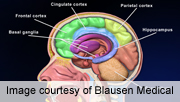- Double Mastectomy May Offer No Survival Benefit to Women With Breast Cancer
- Toxic Lead Found in Cinnamon Product, FDA Says
- Certain Abbott Blood Sugar Monitors May Give Incorrect Readings
- Athletes Can Expect High Ozone, Pollen Counts for Paris Olympics
- Fake Oxycontin Pills Widespread and Potentially Deadly: Report
- Shingles Vaccine Could Lower Dementia Risk
- Your Odds for Accidental Gun Death Rise Greatly in Certain States
- Kids From Poorer Families Less Likely to Survive Cancer
- Tough Workouts Won’t Trigger Cardiac Arrest in Folks With Long QT Syndrome
- At-Home Colon Cancer Test Can Save Lives
Brain Protein Is a Key to ‘Senior Moments,’ Study Finds


WEDNESDAY, Aug. 28A protein in the brain could hold the key to reversing the age-related memory loss that causes “senior moments” of forgetfulness, Columbia University researchers report.
Deficiency of a protein called RbAp48 in the hippocampus appears to significantly contribute to the memory loss that creeps up on you as you age, said study co-author Dr. Scott Small, director of the Alzheimer’s Disease Research Center at the university.
This is a distinct process separate from the drastic memory loss that comes with Alzheimer’s disease, Small added. And, he said, the finding should allay fears that normal “senior moments,” like misplacing keys or forgetting an ATM number, are a precursor to dementia.
“It’s been known for a long time that our memory declines just by the normal wear and tear of the aging process,” Small said. “Our study provides compelling evidence that age-related memory loss is a syndrome in its own right, apart from Alzheimer’s.”
The study, published Aug. 28 in the online edition of Science Translational Medicine, used a combination of human and mouse studies to explore the importance of RbAp48 in memory.
Researchers focused on the hippocampus, a part of the brain that is key to memory and is affected by both age-related memory loss and by Alzheimer’s disease. But while Alzheimer’s is attributed to the buildup of amyloid plaques in the brain’s neurons, no such thing occurs in people experiencing memory loss due to natural aging.
The study began by researchers performing genetic analysis of the brain cells of eight deceased humans, ages 33 to 88, none of whom suffered from any brain disease. Doctors focused on the dentate gyrus, a part of the hippocampus that seems to be most affected by aging.
The most significant changes, they found, occurred in levels of RbAp48 in the dentate gyrus. The amount of RbAp48 declined steadily with aging across all the human subjects.
To confirm whether RbAp48 plays an active role in memory loss, the researchers turned to mice. Examinations of mouse brains found a similar decrease in the protein due to aging. “It turns out that age-related memory loss occurs very similarly in humans and mice,” Small said.
Further, the researchers found that when they reduced the amount of RbAp48 in young mice, those mice experienced the same memory loss that occurs naturally in aging mice. Once the protein returned to normal levels, the young mice’s memory returned to normal.
But what really raised eyebrows occurred when they increased the amount of RbAp48 in the brains of older mice. “We were astonished that not only did this improve the mice’s performance on the memory tests, but their performance was comparable to that of young mice,” said co-author Dr. Elias Pavlopoulos, an associate research scientist at Columbia.
If these findings pan out, doctors may one day be able to use this genetic pathway to improve aging people’s memory through natural or pharmaceutical means, Small said. Physical exercise, dietary supplements or pharmaceuticals could be used to increase RbAp48 in the hippocampus.
Dr. Nupur Ghoshal, an assistant professor of neurology at the Washington University School of Medicine in St. Louis, agreed that this study gives researchers a new take on exploring age-related memory loss.
“Clinically, we’ve known that normal aging and Alzheimer’s are different, but we didn’t really have the thing to work on for normal aging,” said Ghoshal, who was not involved with the study. “This is really the first evidence of a molecule someone can focus in on. Now we have a pathway we can learn a lot more about, and somewhere within that pathway may be a target for intervention.”
Dean Hartley, the director of science initiatives at the Alzheimer’s Association, said the researchers “present an intriguing, preliminary study that may eventually prove to be important in uncovering the pathways of age-related memory decline.”
And, he added, “They provide some very elegant molecular genetics to illustrate the mechanism in mice.” However, the study’s results are weakened because only eight human brains were examined, Hartley said, and the results in mice might not necessarily carry over directly to humans.
“Nevertheless, there is enough preliminary data here that this line of investigation should go forward, especially in light of what it may contribute to our knowledge of ‘normal’ aging and the environmental factors affecting gene regulation,” Hartley said.
More information
For more about age-related memory loss, visit the U.S. National Institute on Aging.
Source: HealthDay
Copyright © 2024 HealthDay. All rights reserved.










